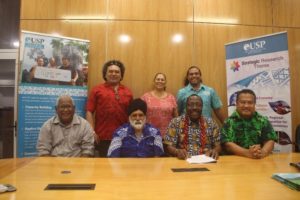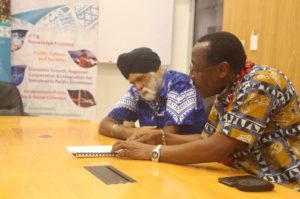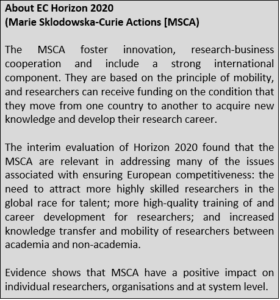A University of the South Pacific and University of New Caledonia joint proposal has won a $1.3million euro European Commission (EC) Horizon 2020 funded multidisciplinary project focusing on family farming and food in the Pacific Islands, from Europe, Fiji, Vanuatu, Solomon Islands, New Caledonia and Australia.

USP’s Vice Chancellor Professor Pal Ahluwalia congratulated the team of academics, researchers and students for winning the consortium, describing the achievement as “outstanding and the 91.8 per cent result reflects the high quality proposal and teaming up with excellent partner institutions” at an informal meeting at the university’s Laucala campus.
Professor Ahluwalia complimented the H2020 win by encouraging the project team to produce the scientific publications in high-ranking journals as well as work on the submissions of other projects for other funding.
“Regular monitoring of the project’s actions by the scientific coordinator is also paramount in the success of this type of H2020 project which opens important opportunities for Pacific Island researchers.”
USP’s Director of Research, Professor Jito Vanualailai praised the team effort and said that the H2020 is one of the most prestigious and competitive research funding sources.
“It is very difficult to access the fund because it requires multi-international teams of researchers to tackle issues that the Europeans have identified to be noteworthy. This was the third attempt by our consortium, the Pacific Islands Universities Research Network, to seek funding from H2020, with the last two attempts ending in failure.

“The fact that we won a H2020 grant implies that our researchers at USP and in other universities in the Pacific Islands are of the highest caliber and can contribute and compete at the international level. I take this opportunity to acknowledge our lead researcher at PACE-SD who contributed to the success of our application by coordinating our efforts, Viliamu Iese,” Prof Vanualailai said.
Under the European Commission’s Horizon 2020 initiative, the Family Farming, Lifestyle and Health (FALAH) project is to explore, strengthen, mobilize and build a network of research teams operating in the Pacific Islands that have a common interest in food security and its relationship with the environment, lifestyle and health.
FALAH project falls under the Marie Sklodowska-Curie Actions within the EC’s Horizon 2020 strategy contributing to excellent research, amplifying employment opportunities, growth and investments by arming researchers with new knowledge, skills and international and an inter-sectoral platform to fill the top positions of tomorrow.
“The final goal is to promote and revitalize family agriculture to improve the health of the population in the Pacific and ensure food security in the context of rapid social and economic transformations and climate change, which effects are particularly harmful to the Pacific region,” said Professor Jean-Marie Fotsing.
Prof Fotsing of the University of New Caledonia is the project coordinator and will foresee the all research and knowledge sharing of the four year project.
“Due to the close relationships between agriculture and food, the project is structured into three complimentary scientific components.
“The scientific results of the research work carried out in the two thematic work packages (food and agriculture) will largely feed into the third working group based on knowledge exchange and communication,” Prof Fotsing said.
The FALAH project involves some 15 multi-disciplinary teams at local, regional and international networks.
“This networking project will mobilize researchers and teaching-researchers from Europe and partners from Vanuatu, Fiji, Solomon Islands, New Caledonia and Australia. During this project, joint meetings in the form of workshops or conferences are planned and at the same time, common areas of exploration and experimentation for future research.”
 Professor Fotsing informed the participants that he will organize in the coming weeks a meeting with the partner teams during this zero phase of the project to consolidate the implications of the and others and define specific schedules and actions during the researchers’ stays.
Professor Fotsing informed the participants that he will organize in the coming weeks a meeting with the partner teams during this zero phase of the project to consolidate the implications of the and others and define specific schedules and actions during the researchers’ stays.
“In this perspective, a seminar will be organized in Nouméa at the end of November to confront and cross the transversalities between teams and partners and finalize the common objectives especially during the first year of the project from April 2020,” Professor Fotsing said.
The partners under the FALAH project are; University of New Caledonia, University of the South Pacific, Institut Agronomique néo-Calédonien, Institut de Recherche pour le Développement, Centre National de la Recherche Scientifique, Université Toulouse 1 Jean-Jaurès, Ludwig Maximilians Universität München, Solomon Islands National University, Vanuatu Agricultural Research and Technical Centre, The University of Sydney, The University of New South Wales, The University of Wollongong, Western Sydney University and South Pacific Community.
USP’s contributions in the FALAH project include the Research Office, Pacific Centre for Environment and Sustainable Development (PaCE-SD), School of Agriculture and Food Technology (SAFT), Institute of Applied Science (IAS), Institute of Marine Resources (IMR) and the Faculty of Arts, Law and Education (FALE).
